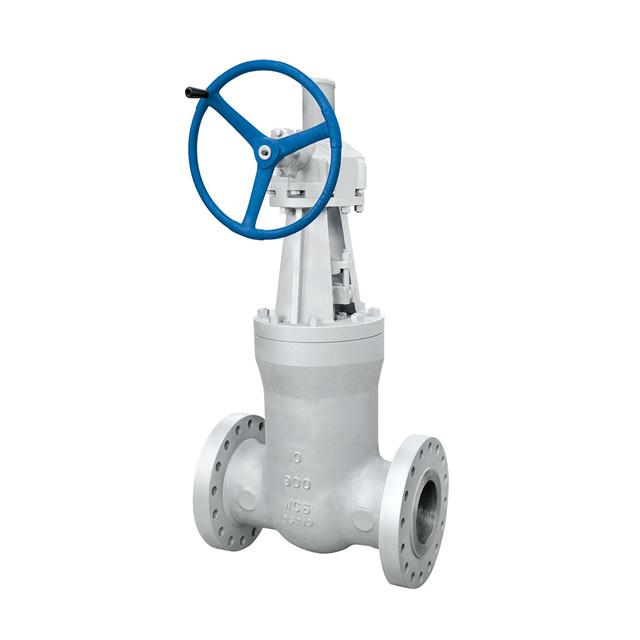Tel : +86-18059296519
Whatsapp : +8618059296519
E-mel : [email protected]
Injap gete meterai tekanan direka bentuk untuk menyediakan reka bentuk padat dan kemudahan penyelenggaraan dalam perkhidmatan tekanan tinggi. Injap ini adalah sejenis injap yang digunakan dalam penjanaan kuasa, pulpa dan kertas, dan kilang penapisan.
Injap pengedap tekanan mula dibangunkan pada awal 1900-an. Mereka pada mulanya diilhamkan untuk membantu menghilangkan berat kapal besar. Di samping itu, ia telah dibangunkan untuk menahan tekanan yang lebih tinggi yang terdapat dalam loji kuasa dan aplikasi perindustrian.
Injap pengedap tekanan telah lama berkembang sejak reka bentuk awalnya. Hari ini, injap ini digunakan terutamanya dalam aplikasi suhu tinggi dan tekanan tinggi. Penarafan tekanan biasa bagi injap pengedap tekanan ialah kira-kira 900 paun.
Injap pintu kedap tekanan sering digerakkan dengan cara hidraulik, elektrik atau pneumatik. Pengendali manual ditawarkan sebagai standard. Kebanyakan pengeluar mengesyorkan kilasan panas. Ia boleh mengurangkan dengan ketara risiko kebocoran melalui badan/sendi Bonet. Walau bagaimanapun, kegagalan untuk memanaskan tork bolt ambil Bonet boleh menyebabkan kerosakan pada Bonet injap, I.D badan injap dan bebibir Bonet injap.
Injap pintu kedap tekanan ialah injap yang direka untuk perkhidmatan tekanan tinggi dalam industri kimia, penjanaan kuasa, pulpa dan kertas serta kilang penapisan. Injap ini menampilkan reka bentuk yang diperkemas dengan profil padat dan berat yang dikurangkan. Ia biasanya digunakan pada tekanan melebihi 100 bar tetapi boleh digunakan untuk aplikasi tekanan rendah. Injap pintu kedap tekanan mempunyai reka bentuk yang unik, menggabungkan gasket logam dengan gelang tujahan bersegmen.
Badan injap mempunyai lubang jejari dan alur di mana gelang segmen dimasukkan. Ia kemudian diketatkan kepada tork yang telah ditetapkan. Ini memastikan permukaan tempat duduk injap dipegang pada tempatnya, mengurangkan risiko kebocoran. Bergantung pada penarafan tekanan, injap boleh mempunyai kapasiti tekanan sehingga 2,500 paun.
Cincin tempat duduk biasanya dibuat daripada aloi CoCr-A. Ini memastikan permukaan pengedap yang ketat. Satu lagi ciri injap pintu kedap tekanan ialah gelang tujahan bersegmen. Ia sesuai dengan alur anulus yang dimesin di dalam badan. Bonet injap adalah keluli palsu. Bahan palsu menawarkan struktur butiran yang lebih halus dan kekuatan bahan yang lebih baik.
Injap kedap tekanan direka bentuk untuk memenuhi keperluan Kod Dandang dan Kapal Tekanan ASME. Injap tersedia dalam pelbagai konfigurasi, seperti glob, swing check, reforming catalytic, dan injap sehala cakera condong. Beberapa injap ini bermotor, membolehkan operasi jauh. Bergantung pada aplikasi, injap boleh dipasang dengan pemampas pengembangan batang suhu tinggi.
Injap pintu kedap tekanan digunakan dalam pelbagai jenis aplikasi, termasuk loji kimia, kilang penapisan, kilang pulpa dan kertas, penjanaan kuasa dan banyak lagi. Reka bentuk yang padat dan berat yang dikurangkan menjadikannya ideal untuk perkhidmatan tekanan tinggi. Ia sering dinyatakan untuk saluran paip cecair, terutamanya yang mempunyai tekanan talian maksimum sekurang-kurangnya 500 psi.
